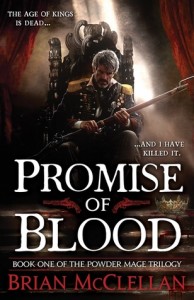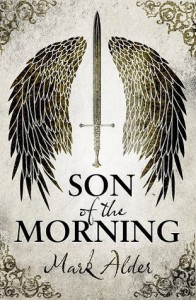Been a bit slow with the rush at the end of the semester, but I wanted to give a quick update on what I’ve been reading before I get back into the swing of things when I start at Tor later this month.
 Drawing on inspiration from the French Revolution, then-debut (the sequel is out as of May 6th) author Brian McClellan brings out the magnificence that is flintlock fantasy. Field Marshal Tamas has overthrown the king in a successful coup and now has to struggle with the vacuum of power that killing a king creates. Taniel Two-Shot, the powder-addicted son of Tamas, and retired inspector Adamat, and the silent savage Ka-poel are among the very interesting cast. Tamas, Taniel, and several others are known as Powder Mages – they can bend gunpowder to their will.
Drawing on inspiration from the French Revolution, then-debut (the sequel is out as of May 6th) author Brian McClellan brings out the magnificence that is flintlock fantasy. Field Marshal Tamas has overthrown the king in a successful coup and now has to struggle with the vacuum of power that killing a king creates. Taniel Two-Shot, the powder-addicted son of Tamas, and retired inspector Adamat, and the silent savage Ka-poel are among the very interesting cast. Tamas, Taniel, and several others are known as Powder Mages – they can bend gunpowder to their will.
This seems like it would be a fairly unfair magic to possess in an age of flintlock weapons that are fired with gunpowder, and in the end, it is. But there are also incredibly powerful mages that comprise the royal cabals of the Nine Nations, as well as air-rifles that, as you might surmise from their names, don’t require powder to shoot.
McClellan was a student in one of Stormlight Archives author Brandon Sanderson’s creative writing classes, and I’ve seen some people that claim that his magic system is too similar to Sanderson’s in Mistborn, in which the user ingests some form of metal to perform magic (in Promise of Blood they ingest powder). Personally, I didn’t see the connection at all while reading, and I think that’s an unfair comparison. It’s like saying that any traditional magic system is borrowing too much from Dragonlance or any classic fantasy you can name.
Anyhow, Promise of Blood is a thrilling read and Brian McClellan is deserving of the attention he is receiving.
 M.D. Lachlan takes on the pseudonym Mark Alder in his latest venture, Son of the Morning. Take the Hundred Years’ War and insert angels and demons and you have the skeleton of the premise. Edward III is a usurper, overthrowing his mother’s consort Roger Mortimer who had previously deposed Edward’s father. His angels have abandoned him, and his only hope to defeat Philip of Valois and his angels appears to lie in seeking aid from Hell.
M.D. Lachlan takes on the pseudonym Mark Alder in his latest venture, Son of the Morning. Take the Hundred Years’ War and insert angels and demons and you have the skeleton of the premise. Edward III is a usurper, overthrowing his mother’s consort Roger Mortimer who had previously deposed Edward’s father. His angels have abandoned him, and his only hope to defeat Philip of Valois and his angels appears to lie in seeking aid from Hell.
My mentality when starting Son of the Morning was that I’d be reading a novel of the Hundred Years’ War with angels and demons as a supporting idea. What I received was a story of angels and demons with a backdrop in the Hundred Years’ War (or perhaps 50/50). After reading Edward’s first few chapters, I wrongly assumed the majority of Son of the Morning would focus on his campaigning in the war. Alder painted him so vividly as an ambitious young king, out to change his kingdom and the world, that I was a bit disappointed in his lack of page time.
A significant portion of the story was given to Dowzabel, a Luciferian young boy who’s torn from his village and forced into the games of politics and war – as well as William Montagu, one of Edward’s most trusted generals. To go along with this, I felt that the pacing of the novel for the first half (the novel itself is 779 pages) was somewhat uneven, but it recovered for the latter half and the battle of Sluys revealed the awesome wrath of the angels.
Overall, I am definitely anticipating the sequel and despite some others’ reviews, I didn’t feel that Son of the Morning was particularly “preachy” in terms of the role Christianity played. Read my interview with Mark here.

Got a mini rush of new stuff here until early July, then I will hopefully stop getting distracted and try Promise of Blood myself. I bought it around christmas, there isn’t much of an excuse here.
It’s a very fast read. Already own it, can’t hurt to try…you’re right, no excuse!